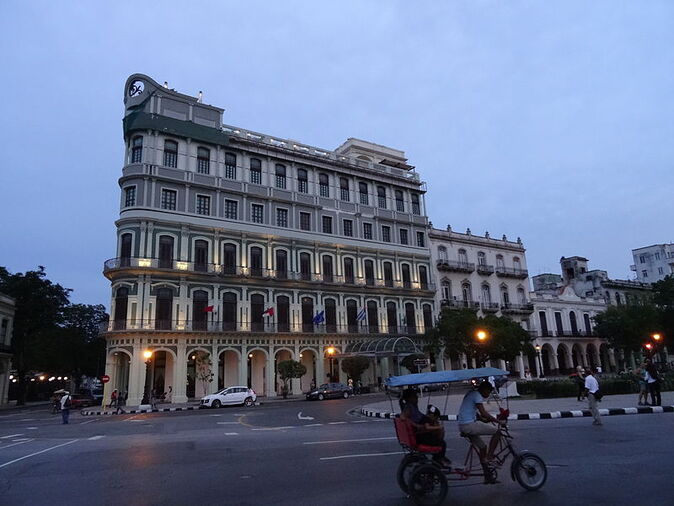|
At first, there was an explosion. The six-story building vibrated, and a few wires snapped with the force of a whiplash. Immediately afterward, more than half of the facade collapsed without any warning, with each floor swallowing the one above as the ceiling crushed against the floor and the floor against the ceiling during the explosion, and a cloud of dust hid everything except the desperate screams of people. It seemed as if the ground had just opened and closed when two other buildings collapsed in the vicinity. The causes of the incident at the Hotel Saratoga in Old Havana on May 6 were immediately known, although the investigation is still ongoing: it was a gas leak from a tanker truck servicing the hotel building, which was preparing to reopen during the second week of May. With no guests, the rooms were locked tight, and a simple click of the light switch would have been enough for the mass of accumulated gas to cause the shock wave that shattered the glass, marquetry and ornately decorated facade of green and white stucco, which was originally from the 19th century. It is not the first time that Cuba has mourned tragedies like this. An accident like this might seem even minor in a country that has suffered more than 30 major hurricanes in half a century, dozens of deaths during the CIA sabotage of the steamship La Coubre in the port of Havana in 1960, the blowing up of a commercial airliner with 73 passengers in 1976, a chain of bombs in hotels and restaurants in the 1990s, the eternal blockade imposed by the United States government, a “rogue action,” as Mexican President Andrés Manuel López Obrador calls it—that has naturalized the shortage of almost everything and made the pandemic more desperate, just to cite a few dramatic examples. But no. The explosion at the Saratoga Hotel, with almost 100 injured victims—including 43 deaths as of May 11—is something else. What made this story in particular the big news story was not the explosion that was felt in Havana, nor the dense smoke that could be seen overhead, nor the feeling of vulnerability that it left us all experiencing, but rather it was the solidarity of the citizens who crowded around the area demanding a place to rescue the victims from the rubble, and donated their blood for the wounded or helped alleviate the anguish of the victims. Two hours after the accident, the line of volunteers in front of blood banks, polyclinics and hospitals exceeded thousands, and most of them were young people, the same ones who Miami’s propaganda says are leaving Cuba en masse. While the government acts and the public press teaches immediacy and sensitivity, people from the streets, from all kinds of professions, continue to help their compatriots. We do not know the names of all those who were part of the rescue teams—many of them are volunteer firefighters—or of the teachers of the “Concepción Arenal” school that is right next to the hotel who protected their students, of the children who saved other children, of the passersby who helped the Saratoga workers and the families residing in the other two buildings that imploded in the neighborhood, nor the sniffer dogs that are still looking for the traces of at least two missing persons in the rubble. When crashing, the buildings showed their viscera, their arteries, their nerves and their fragility, similar to ours. But they also exposed that kind of decent sentimentalists who are not in danger of extinction and who are the best of us all, the heroes who went out to save others, not realizing that another explosion and another collapse could have made them victims. And, at the same time, there is an anonymous army of health workers who have not rested for more than 100 hours since the accident. In Soldiers of Salamis, the Spanish novelist Javier Cercas reminds us that “in the behavior of a hero there is almost always something blind, irrational, instinctive, something that is in their nature and from which they cannot escape.” They are the ones who look squarely at the absurdity and cruelty of life to make us more human, and they are the ones who warn us that struggle is born from despair. And once again, death does not prevail. AuthorRosa Miriam Elizalde is a Cuban journalist and founder of the site Cubadebate. She is vice president of both the Union of Cuban Journalists (UPEC) and the Latin American Federation of Journalists (FELAP). She has written and co-written several books including Jineteros en la Habana and Our Chavez. She has received the Juan Gualberto Gómez National Prize for Journalism on multiple occasions for her outstanding work. She is currently a weekly columnist for La Jornada of Mexico City. This article was produced by Globetrotter. Archives May 2022
2 Comments
Alexis
5/18/2022 01:36:30 pm
It’s so fucked up how we lie about Cuba. It’s literally a socialist paradise, or damn near to it, and to say that people are leaving while theyre actually helping with everything they can is totally fucked up and portrays a good country and government and a heroic and kind population as evil and scared. Viva Cuba 🇨🇺
Reply
Robert Zucconi
5/6/2023 07:45:45 am
Yes it is Alexis.. it saddens me but the truth is the USA government is much more concerned with profits than people.
Reply
Leave a Reply. |
Details
Archives
July 2024
Categories
All
|

 RSS Feed
RSS Feed